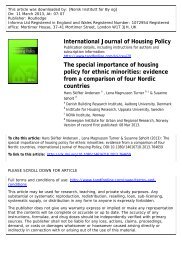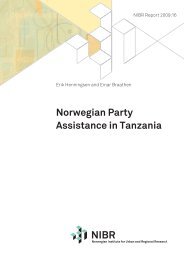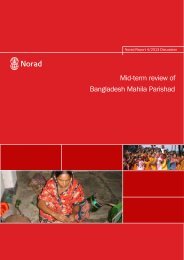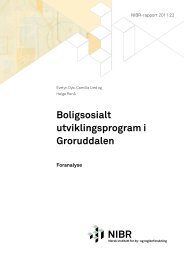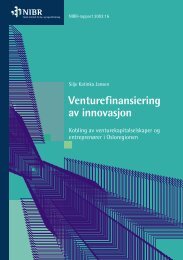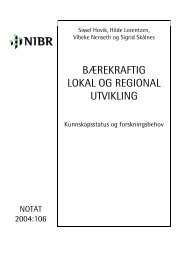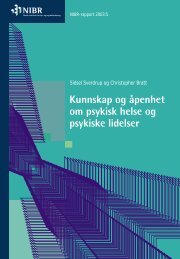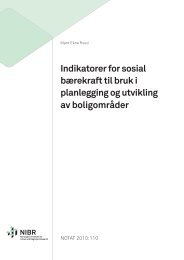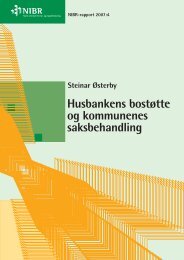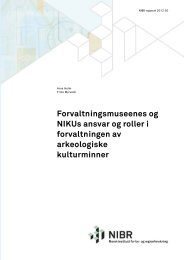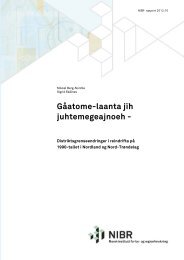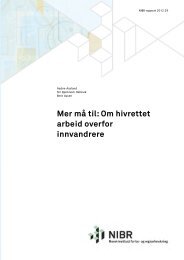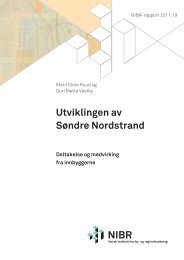Evaluation of the Southern and Eastern Africa Regional Centre for ...
Evaluation of the Southern and Eastern Africa Regional Centre for ...
Evaluation of the Southern and Eastern Africa Regional Centre for ...
- No tags were found...
You also want an ePaper? Increase the reach of your titles
YUMPU automatically turns print PDFs into web optimized ePapers that Google loves.
4 Sustainability <strong>of</strong> <strong>the</strong> SEARCWL414.1 Financial ManagementIn terms <strong>of</strong> <strong>for</strong>mal organisation <strong>of</strong> financial management, this is well structured by<strong>the</strong> programme agreement as follows: “The agreement provides <strong>for</strong> regular reportingby SEARCWL. The main reporting vehicle is <strong>the</strong> Annual Meeting that is held toreview progress each year <strong>and</strong> approve plans <strong>for</strong> <strong>the</strong> following year. The AnnualMeeting is held in December <strong>and</strong> is preceded by <strong>the</strong> submission <strong>of</strong> a number <strong>of</strong>reports. A progress report, which reports on <strong>the</strong> progress made against <strong>the</strong> work plan<strong>and</strong> budget, detailed financial statements <strong>for</strong> <strong>the</strong> programme which present a truepicture <strong>of</strong> income <strong>and</strong> expenditure <strong>and</strong> reconciled positions <strong>of</strong> cash <strong>and</strong> bankbalances, <strong>and</strong> a work plan <strong>and</strong> budget <strong>for</strong> <strong>the</strong> incoming year. The RNE responds to<strong>the</strong> reports be<strong>for</strong>e <strong>the</strong> meeting. The minutes <strong>of</strong> <strong>the</strong> meeting are signed by bothparties after <strong>the</strong> meeting.” This agreement has been adhered to in a timely <strong>and</strong>efficient manner, as recognised by all parties. However, <strong>the</strong>re have been a number <strong>of</strong>different financial funding arrangements over <strong>the</strong> years. These have largely been acreative response to challenges <strong>of</strong> financial management in Zimbabwe.From 1990 until 2008 funding was channelled from NMFA/RNE to <strong>the</strong> UoZ, <strong>and</strong><strong>the</strong>n onwards to <strong>the</strong> SEARCWL. The UoZ Bursar’s Office was responsible <strong>for</strong>financial management <strong>and</strong> keeping <strong>the</strong> books <strong>of</strong> accounts <strong>and</strong> organising audits. Themajority <strong>of</strong> <strong>the</strong> funds were transferred to <strong>the</strong> UoZ account, <strong>and</strong> SEARCWL drew on<strong>the</strong>m when needed. A proportion <strong>of</strong> funds covering external payments weretransferred into <strong>the</strong> UiO account. However, since <strong>the</strong> seizure <strong>of</strong> <strong>the</strong> UoZ funds in2008 by <strong>the</strong> Reserve Bank <strong>of</strong> Zimbabwe (RBZ), <strong>and</strong> <strong>the</strong> subsequent loss <strong>of</strong> access to$47 000, funds <strong>for</strong> regional expenditure were disbursed into <strong>and</strong> hence from <strong>the</strong> UiOaccount. Limited amounts were kept in <strong>the</strong> UoZ account in London <strong>and</strong> also inGaborone. SEARCWL, <strong>the</strong> UoZ <strong>and</strong> <strong>the</strong> RNE are still following up with <strong>the</strong>Reserve Bank <strong>of</strong> Zimbabwe to recover <strong>the</strong> funds seized. Several letters have beenwritten to <strong>the</strong> Governor, some copied to <strong>the</strong> Minister <strong>of</strong> Finance. To date, onlyUSD$2000 has been repaid. When <strong>the</strong> funds went through <strong>the</strong> Oslo account,SEARWCL was responsible <strong>for</strong> <strong>the</strong> maintenance <strong>of</strong> records <strong>and</strong> production <strong>of</strong>accounts.In relation to <strong>the</strong> transfer <strong>of</strong> responsibility back to SEARCWL, according to <strong>the</strong>MTR in 2010 <strong>the</strong>re was a delay in maintenance <strong>of</strong> records, <strong>the</strong> production <strong>of</strong> finalaccounts <strong>and</strong> external audits. This necessitated <strong>the</strong> engagement <strong>of</strong> an experiencedthough part-time Bookkeeper who <strong>the</strong> evaluators underst<strong>and</strong> has since developedappropriate systems. External audits, <strong>for</strong> example, are now up to date. In 2013, threemonthly disbursements have commenced, again, as a risk-aversion strategy toprevent <strong>the</strong> capture <strong>of</strong> funds by <strong>the</strong> banks. According to SEARCWL’s annual report



